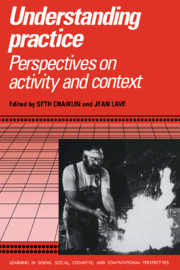Book contents
- Frontmatter
- Contents
- Series foreword
- List of contributors
- Part I Introduction
- Part II Learning craftwork
- 2 Learning to navigate
- 3 Developmental studies of work as a testbench of activity theory: The case of primary care medical practice
- 4 Re-searching psychotherapeutic practice
- 5 Thinking and acting with iron
- 6 Artificial intelligence as craftwork
- 7 Behavior setting analysis of situated learning: The case of newcomers
- Part III Learning as social production
- Part IV Conclusion
- Author index
- Subject index
- Learning in Doing: Social, Cognitive, and Computational Perspectives
5 - Thinking and acting with iron
Published online by Cambridge University Press: 06 January 2010
- Frontmatter
- Contents
- Series foreword
- List of contributors
- Part I Introduction
- Part II Learning craftwork
- 2 Learning to navigate
- 3 Developmental studies of work as a testbench of activity theory: The case of primary care medical practice
- 4 Re-searching psychotherapeutic practice
- 5 Thinking and acting with iron
- 6 Artificial intelligence as craftwork
- 7 Behavior setting analysis of situated learning: The case of newcomers
- Part III Learning as social production
- Part IV Conclusion
- Author index
- Subject index
- Learning in Doing: Social, Cognitive, and Computational Perspectives
Summary
In theory
In 1957 Ward Goodenough created a new mandate for anthropologists. He directed our attention to knowledge and action by setting the anthropologists' task as that of accounting for “whatever it is one has to know or believe in order to operate in a manner acceptable to … [society's] members” (Goodenough, 1957, p. 167). This passage has been repeatedly cited but it is worth doing so again for, in spite of repeated citations, scholars in anthropology and related fields have typically focused on the first element of this phrase “whatever it is one has to know or believe” to the exclusion of an account of the second and equally important element, “in order to operate in a manner acceptable.” What Goodenough's mandate requires is an account of knowledge and action in tandem: a dynamic approach to their complex interrelations. We argue that knowledge and action are each open to alteration by the other as behavior proceeds and that Goodenough's term whatever is not static and factual but is productive and conceptual.
In what follows we shall outline such an approach and apply it to a detailed example from blacksmithing in order to answer the question, What is it the smith needs to know in order to produce a specific artifact? Our goal in this research is to illuminate the complex interdependence of knowledge and action.
We start with the position that not only do ideas about the world affect action in the world, but ongoing perceptions of that action in the world affect the organization and content of ideas.
Information
- Type
- Chapter
- Information
- Understanding PracticePerspectives on Activity and Context, pp. 125 - 143Publisher: Cambridge University PressPrint publication year: 1993
Accessibility standard: Unknown
Why this information is here
This section outlines the accessibility features of this content - including support for screen readers, full keyboard navigation and high-contrast display options. This may not be relevant for you.Accessibility Information
- 23
- Cited by
